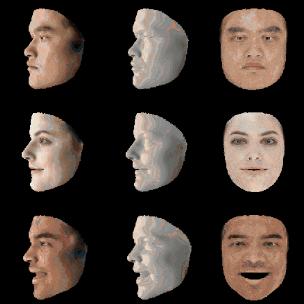Search Results for author: Yating Wang
Found 12 papers, 3 papers with code
Eyeglasses 3D shape reconstruction from a single face image
no code implementations • ECCV 2020 • Yating Wang, Quan Wang, Feng Xu
A complete 3D face reconstruction requires to explicitly model the eyeglasses on the face, which is less investigated in the literature.
MotionMaster: Training-free Camera Motion Transfer For Video Generation
no code implementations • 24 Apr 2024 • Teng Hu, Jiangning Zhang, Ran Yi, Yating Wang, Hongrui Huang, Jieyu Weng, Yabiao Wang, Lizhuang Ma
Furthermore, we propose a few-shot camera motion disentanglement method to extract the common camera motion from multiple videos with similar camera motions, which employs a window-based clustering technique to extract the common features in temporal attention maps of multiple videos.
Learning Topology Uniformed Face Mesh by Volume Rendering for Multi-view Reconstruction
no code implementations • 8 Apr 2024 • Yating Wang, Ran Yi, Ke Fan, Jinkun Hao, Jiangbo Lu, Lizhuang Ma
Our goal is to leverage the superiority of neural volume rendering into multi-view reconstruction of face mesh with consistent topology.
Learning-based Multi-continuum Model for Multiscale Flow Problems
no code implementations • 21 Mar 2024 • Fan Wang, Yating Wang, Wing Tat Leung, Zongben Xu
Multiscale problems can usually be approximated through numerical homogenization by an equation with some effective parameters that can capture the macroscopic behavior of the original system on the coarse grid to speed up the simulation.
Point Cloud Matters: Rethinking the Impact of Different Observation Spaces on Robot Learning
no code implementations • 4 Feb 2024 • Haoyi Zhu, Yating Wang, Di Huang, Weicai Ye, Wanli Ouyang, Tong He
In this study, we explore the influence of different observation spaces on robot learning, focusing on three predominant modalities: RGB, RGB-D, and point cloud.
AMS-Net: Adaptive Multiscale Sparse Neural Network with Interpretable Basis Expansion for Multiphase Flow Problems
no code implementations • 24 Jul 2022 • Yating Wang, Wing Tat Leung, Guang Lin
In this work, we propose an adaptive sparse learning algorithm that can be applied to learn the physical processes and obtain a sparse representation of the solution given a large snapshot space.
An adaptive Hessian approximated stochastic gradient MCMC method
no code implementations • 3 Oct 2020 • Yating Wang, Wei Deng, Guang Lin
The bias introduced by stochastic approximation is controllable and can be analyzed theoretically.
Bayesian Sparse learning with preconditioned stochastic gradient MCMC and its applications
no code implementations • 29 Jun 2020 • Yating Wang, Wei Deng, Lin Guang
The algorithm utilizes a set of spike-and-slab priors for the parameters in the deep neural network.
XCloud: Design and Implementation of AI Cloud Platform with RESTful API Service
1 code implementation • 14 Dec 2019 • Lu Xu, Yating Wang
In recent years, artificial intelligence (AI) has aroused much attention among both industrial and academic areas.
Distributed, Parallel, and Cluster Computing
Efficient Deep Learning Techniques for Multiphase Flow Simulation in Heterogeneous Porous Media
1 code implementation • 22 Jul 2019 • Yating Wang, Guang Lin
In particular, for the flow problem, we design a network with convolutional and locally connected layers to perform model reductions.
Numerical Analysis Numerical Analysis
Data-driven Approach for Quality Evaluation on Knowledge Sharing Platform
1 code implementation • 1 Mar 2019 • Lu Xu, Jinhai Xiang, Yating Wang, Fuchuan Ni
In recent years, voice knowledge sharing and question answering (Q&A) platforms have attracted much attention, which greatly facilitate the knowledge acquisition for people.
Deep Multiscale Model Learning
no code implementations • 13 Jun 2018 • Yating Wang, Siu Wun Cheung, Eric T. Chung, Yalchin Efendiev, Min Wang
Numerical results show that using deep learning and multiscale models, we can improve the forward models, which are conditioned to the available data.




